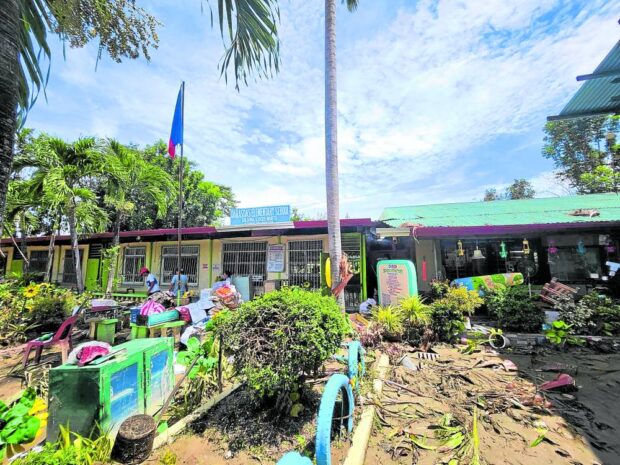
AFTERMATH | Teachers try to salvage teaching materials and furniture at Darasdas Elementary School in Solsona, Ilocos Norte, on Monday after torrential rains and fierce winds destroyed the school’s buildings and tore gutters and roofs at the height of the onslaught of Typhoon “Egay” (international name: Doksuri) last week. (Photo courtesy of ALFONSO DE LOS REYES)
MANILA, Philippines — A total of 169 schools in nine regions have been damaged by last week’s Typhoon Egay (international name: Doksuri) and the southwest monsoon, based on the monitoring of the Department of Education (DepEd) as of July 28.
The regions with damaged school buildings and facilities are the Cordillera Administrative Region, Metro Manila, Ilocos, Cagayan Valley, Central Luzon, Calabarzon (Cavite, Laguna, Batangas, Rizal and Quezon), Mimaropa (Mindoro provinces, Marinduque, Romblon, and Palawan), Bicol and Eastern Visayas.
The total estimated cost of reconstruction and rehabilitation was around P810 million, the DepEd said on Monday.
Despite the toll on public learning facilities wrought by Egay, at least 68 schools from the Cordillera, Cagayan Valley, Central Luzon, Calabarzon, and Mimaropa were still being used as evacuation centers for residents displaced by the storm as of July 25.
In the Ilocos provinces, government officials feared that schools might not be ready for the opening of classes on Aug. 22.
Sen. Imee Marcos, who joined her brother, President Ferdinand Marcos Jr., in a post-typhoon situation briefing at the Ilocos Norte capitol on July 29, pointed out that the timing of Egay was “unfortunate” since it wreaked havoc ahead of school opening next month.
“The schools have suffered significant damage; I don’t think they are within the capability of Brigada Eskwela,” she said.
Brigada Eskwela is a community-driven program of the DepEd that helps schools prepare for the opening of classes.
Imee appealed to the President for immediate help to rebuild these schools on behalf of the DepEd.
President Marcos, in response, had said the government was hastening the inventory of damaged schools to pave the way for immediate rehabilitation and ensure a smooth opening of classes in August.
2-foot mud
Among those damaged by Egay were public schools in the towns of Bacarra, Badoc, Bangui and Vintar, all in Ilocos Norte.
In Solsona town, also in Ilocos Norte, teachers who returned to Darasdas Elementary School after Egay had subsided found their classrooms, covered court, school files and reading materials covered in at least 2-foot-deep mud.
“The whole school needs rehabilitation, with all rooms and information and communication technologies tools getting washed away by rainwater after Egay also tore roofs and gutters,” Solsona information officer Alfonso de los Reyes told the Inquirer on Monday.
He said they were still making an assessment to determine the extent of the damage caused by Egay to other schools.
In Ilocos Norte’s capital city of Laoag, one of the worst-hit areas in the province, schools have incurred an estimated damage of around P41 million so far, according to Cherry Joy Garma, information officer of the DepEd Schools Division of Laoag.
Garma said that at least 61 schools incurred damage because of massive flooding and toppled trees at the height of Egay’s onslaught.
About P62 million would be needed to repair these damaged schools, according to Valerie Talamayan, information officer of the DepEd Schools Division in Ilocos Norte.
“Mabigat itong nangyari (The toll was heavy) because the rains were much heavier than we’ve had in recent times,” President Marcos had noted, citing the effects of climate change.
Health supplies
Appeals were also made for the Department of Health (DOH) to send more medicines and health supplies to areas devastated by Egay.
“We know that inevitable infections will arise — cholera, dysentery, and even cases of dengue — after the disaster,” Imee said.
The senator also requested the DOH to “institute free consultations and [have] roving medical teams” in disaster-hit areas following reports that there were cases of cardiac arrest during the typhoon. She also asked the DOH for diabetes and hypertension medicines.
On Sunday, the DOH said that a medical and response team composed of doctors, nurses, and engineers were deployed to assist and provide post-calamity health assistance to residents affected by Egay.

